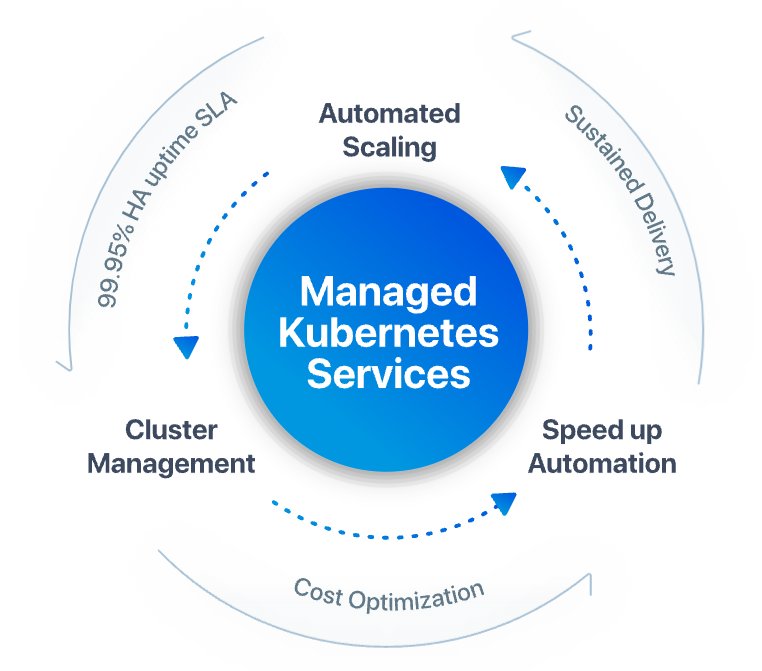
Best Kubernetes Cloud Provider (Image by eInfoChips)

Best Kubernetes Cloud Provider (Image by eInfoChips)
A Kubernetes Managed Service Providers (MSP) simplifies the complexities of managing Kubernetes clusters.
With the increasing intricacy of Kubernetes deployments, businesses often seek expert support to ensure optimal performance and reliability.
These Kubernetes MSPs offer a suite of services, from setup to day-to-day management, to offload the operational burden from your team.
Given Kubernetes’ role as a critical infrastructure component for cloud-native applications, leveraging a managed service can significantly reduce the total cost of ownership and accelerate development velocity.
Recent trends highlight a growing dependency on Kubernetes for cloud migrations. According to findings by Dynatrace in 2023, Kubernetes has emerged as the foremost platform for transitioning workloads to the public cloud.
The expansion rate of Kubernetes clusters in the cloud has skyrocketed, with an annual growth rate of over 127%, making it approximately five times quicker than the expansion of on-premises clusters.
This rapid growth has shifted the landscape significantly, with the proportion of cloud-hosted clusters rising from 31% in 2021 to 45% in 2022.
This trend suggests that cloud-based Kubernetes deployments will soon surpass their on-premises counterparts, highlighting the strategic shift towards cloud-hosted solutions for enhanced scalability and operational efficiency.
Moreover, most Kubernetes clusters in the cloud are managed by leading cloud providers, highlighting a strong preference for managed solutions.
Now, let’s explore the Kubernetes MSPs in more detail.
Kubernetes MSPs deliver comprehensive services tailored to enhance operational efficiency, performance, and security.
By handling the intricate aspects of Kubernetes, MSPs allow businesses to focus on their core functions, accelerating development cycles and reducing the total cost of ownership.
From initial setup and routine maintenance to ensuring scalability and enforcing stringent security measures, these providers play a pivotal role in the seamless operation of Kubernetes environments.
At the forefront, effective cluster management ensures that Kubernetes environments are not just operational but also fine-tuned for peak performance and cost efficiency.
Kubernetes MSPs employ advanced tools and expertise for continuously monitoring, adjusting, and updating clusters.
This vigilant management prevents downtime, bolsters security, and guarantees that deployments run smoothly.
Furthermore, MSPs facilitate seamless scaling of operations, allowing businesses to adapt to changing needs without the steep learning curve often associated with Kubernetes management.
Moreover, Kubernetes MSPs offer scalable solutions that grow with your business. They manage auto-scaling settings to ensure your applications have the necessary resources without overspending.
High availability is also a priority, with setups designed to reduce downtime and maintain service continuity even during component failures.
This focus on scalability and reliability supports your business’s growth and enhances customer satisfaction.
In the Kubernetes ecosystem, security and compliance are paramount. MSPs are essential in shielding your environment from vulnerabilities and ensuring compliance with regulatory standards.
Through comprehensive security strategies that encompass regular audits, real-time threat detection, and automated policy enforcement, MSPs help protect your infrastructure.
This effort secures your sensitive data and cultivates trust with your customers by upholding high security and compliance standards.
MSPs significantly streamline development pipelines via the automation of CI/CD processes.
By harnessing the power of Kubernetes, they foster an agile development environment, enabling quicker and more reliable software releases.
This automation spans beyond mere deployment to include features like auto-scaling, self-healing capabilities, and rollback functionalities.
Consequently, your businesses can hasten market delivery while maintaining high quality and reliability standards.
Kubernet MSPs offer a range of benefits that can significantly impact our businesses, from simplifying deployment to ensuring our applications run smoothly.
We can focus on driving growth and innovation by leveraging Kubernetes MSPs to ensure our applications are scalable, reliable, and efficiently managed.
Kubernetes MSPs offer full lifecycle management of containerized applications and straightforward Kubernetes cluster management.
They allow for easy deployment, scaling, and management of applications, ensuring high performance and scalability.
Kubernetes’ automation capabilities are game-changers that automate containerised applications’ deployment, scaling, and management.
This automation saves time and reduces errors, allowing our teams to focus more on delivering value.
Moreover, Kubernetes’ affordability presents a cost-effective solution for managing applications with services like Google Kubernetes Engine.

One of the standout features of Kubernetes is its multi-cloud capability, providing a flexible solution for managing containerized applications across different cloud providers.
This flexibility helps avoid vendor lock-in and allows us to leverage each cloud managed service provider’s best features and capabilities.
Kubernetes guarantees the stability of our applications, a crucial factor for maintaining performance.
No matter the complexity or features of the application, Kubernetes ensures it runs smoothly, providing a reliable platform for deploying our services.
Kubernetes simplifies rolling out new software versions and handling rollbacks, minimizing downtime and ensuring maximum availability.
This feature is invaluable for maintaining the continuity of our services and quickly addressing any issues that arise during the update process.
Kubernetes is an open-source platform designed to automate, deploy, and scale applications packaged in containers. It offers an easy and declarative approach to managing containerized applications across various environments.
Kubernetes is like the backbone of modern app deployment, letting you manage containers at scale.
Kubernetes ensures they’re efficiently loaded, managed, and scaled. But, managing Kubernetes itself? That’s a whole different sea to sail. It demands time, expertise, and resources.
In navigating the Kubernetes landscapes, you’ll encounter two main types of Kubernetes: unmanaged (or self-managed) Kubernetes and managed Kubernetes services.
With unmanaged Kubernetes, you’re responsible for setting up and maintaining the environment. This option is for those who prefer or require hosting outside a cloud provider’s infrastructure.
This includes installing, configuring, and maintaining the Kubernetes cluster on your own.
Whether setting up the nodes (virtual machines) yourself, from the master node that controls the cluster down to the worker nodes where your applications run, every step requires your direct involvement.
On the flip side, managed Kubernetes services offered by cloud providers like Google Kubernetes Engine (GKE), Amazon’s Elastic Kubernetes Service (EKS), and others lift much of this operational burden off your shoulders.
These services automate the provisioning of the Kubernetes infrastructure, from creating the cluster to configuring the worker nodes.
They provide a more convenient experience, often through a web interface or a command-line interface (CLI), allowing for easier scaling and updates of your Kubernetes version.
The choice between unmanaged and managed Kubernetes hinges on your specific needs and capabilities.
Unmanaged Kubernetes offers full control and customization but demands a higher level of expertise and commitment to maintenance.
Managed Kubernetes service, while possibly more restrictive in terms of customization, offers simplicity, reduced operational overhead, and, often, a more cost-effective solution.
The managed Kubernet service is commonly suitable for those looking to leverage Kubernetes without the complexity of managing it directly.
But, the problem is choosing the right MSP feels like finding a growth partner, not just a service provider. We get it.
Picking the right or locally managed service provider feels like hunting for a partner for the long haul, not just a fly-by-night service.
You want transparency, where costs don’t suddenly jump out of the shadows, and flexibility that fits snugly within your budget, all while making sure every penny you spend is doing its due diligence.
We are pleased to present Octobits as an appropriate cloud MSP tool. Octobits provides a clear breakdown of costs so there are no surprises down the line.
It’s like that reliable friend who lays everything out on the table: no hidden fees, no surprises.
Octobits gives you a crystal-clear snapshot of your tech environment, simplifying how you keep an eye on, fix, and fine-tune your gadgets and apps.
It’s all about keeping things running smoothly, spotting hiccups before they become headaches, and ensuring you’re always in the know.
Plus, we are throwing in a sweet deal: free access until June 2024. How’s that for a growth partner?
Kubernetes Managed Service Providers (MSPs) offer crucial support for businesses navigating the complexities of Kubernetes deployments.
These MSPs simplify cluster management, enhance operational efficiency, and ensure high performance and reliability, significantly reducing the total cost of ownership and accelerating development velocity.
With the increasing adoption of Kubernetes for cloud migrations and the rapid growth of cloud-hosted Kubernetes clusters, managed services are becoming the preferred choice for businesses seeking scalable, secure, and efficient Kubernetes deployments.
So yes, Kubernetes managed service providers automate many operational challenges, allowing businesses to focus on innovation and growth.